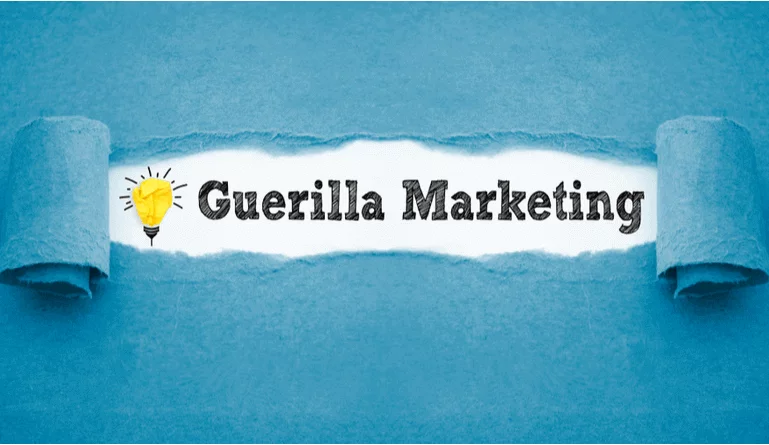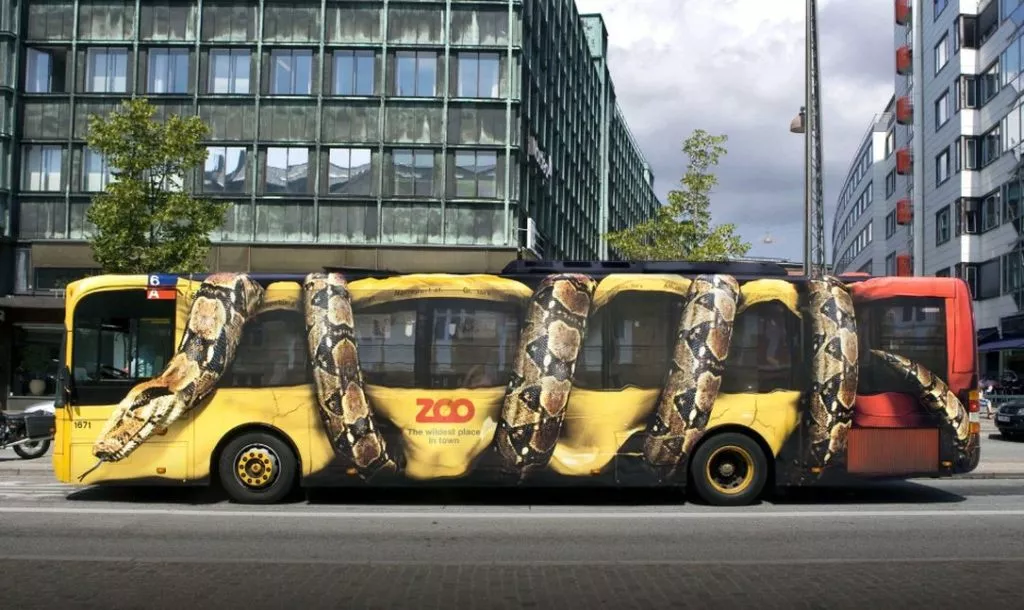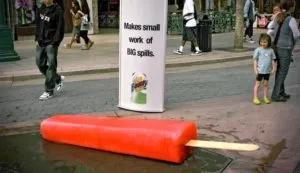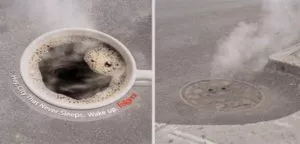Guerrilla marketing is a marketing strategy that has been used effectively for decades. Though it began as a strategy for small businesses on a tight budget, large corporations quickly saw the benefits of guerrilla marketing and employed the tactics, as well.
Any business aiming to increase sales, brand awareness, and loyalty should add guerrilla marketing tactics to its current strategy. Learn more about this powerful method, how it works, and how you can put it to work below.
What Is Guerrilla Marketing?
Guerrilla marketing is a common term used among brands and businesses, but it is not fully understood. This is because it encompasses such a wide range of marketing methods that it can seem difficult to explain easily.
The technical definition of guerrilla marketing, according to the Oxford dictionary, is “innovative, unconventional, and low-cost marketing techniques aimed at obtaining maximum exposure for a product.” Others define guerrilla marketing simply as using unconventional methods to build brand awareness and increase sales.
So, what’s guerrilla marketing? The simplest guerrilla marketing definition is using non-traditional promotional avenues that catch people off guard in daily activities. You can read more about the tactics to gain a more in-depth understanding below.
The History of Guerrilla Marketing
Guerrilla marketing is a term that was first used by Jay Conrad Levinson in the book Guerrilla Marketing. The idea was derived from guerrilla warfare, a term used to describe unconventional techniques used in battle for centuries.
Guerrilla warfare was intended to shock, awe, and ultimately defeat the enemy through irregular tactics, such as ambushes, raids, and hit-and-run strategies. These tactics were typically carried out by armed civilians and other small groups who were not directly related to the military. They were also very effective at drumming up publicity and support, even from some groups who did not wish to get involved.
Jay Conrad Levinson examined the success of guerrilla warfare and adapted it to marketing. He shared that the “shock and awe” tactics were very effective for creating publicity, increasing popularity, and garnering support for a company’s product or service.
After the release of his book in 1984, businesses began adopting this idea, and street promotion was born. Over the years, the specific tactics have expanded to cater to social media and the digital world, but the foundational principles remain the same.
How It Works
The public has become somewhat “nose blind” to most traditional marketing tactics. Being bombarded by endless emails, texts, social media ads, and even billboards make them easy to ignore. To be successful, you must be able to stand out among the crowd, but this can be difficult to do when the public ignores the entire crowd.
Using guerrilla marketing is the equivalent of being the sun suddenly breaking through the clouds on a gloomy day. It is unexpected, bright, and impossible to ignore.
Guerrilla marketing means shocking people in the midst of their regular daily routine. For instance, they are walking to work the same way they do every day. Their minds are accustomed to the pattern and color of the sidewalk, so they can tune and move robotically through their walk.
Suddenly, in the midst of the dull, worn-down sidewalk, they come upon a bright advertisement painted on one section. It is so unexpected and out of the norm that it breaks through the fog in their minds.
They have to stop and pay attention. Often, they’ll take pictures and share them across their social media pages. And they’ll think about it for some time afterward – and share it with their friends.
Guerrilla marketing is all about breaking up the mundane. It is about putting something unexpected in the eye of the public that they simply can’t overlook.
Types of Guerrilla Marketing
Guerrilla marketing can come in many shapes and forms, but the following are some of the most common types used today.
-
Street Marketing:
Street marketing is an out-of-the-box attempt to cement a brand or product into the public’s mind. The tactics are carried out in highly visible areas. Street marketing includes several activities, including flash mobs, product samples or demonstrations, walking billboard ads, roadshows, and more.
-
Ambient Marketing:
Ambient marketing promotes products or services through unexpected places, typically utilizing the environment. It’s a slight break in what people expect as normal and tends to help them remember the brand.
One example of a great ambient guerrilla marketing example is IBM’s placement of rain coverings and benches on the sides of buildings, which are shown below. You might also find ambient ads on hand dryers in restrooms, the backs of receipts, or hand straps on the subway.
-
Viral Marketing:
The idea behind viral marketing is simply to make a message spread – like a virus. The marketing tactic should catch the attention of people who see it, who then pass it on to a couple of friends. They then pass it on to others, and it continues to spread.
There is no guarantee that promotion will go viral, but the more attention you can grab, the higher your chances. While viral marketing does have a class all its own, it is an essential component of many guerrilla marketing techniques.
-
Ambush Marketing:
Ambush marketing is a tactic in which companies attempt to utilize an event that already has sponsors. For instance, Adidas might be the official sponsor of a game, though Nike might slide in and sponsor an individual player.
-
Grassroots:
Grassroots marketing is intended to build a personal connection with the audience. It targets smaller groups on a more individual basis with the idea that the audience will share it with others. It’s similar to viral marketing in this way but with a much smaller initial target.
Guerrilla Marketing Components
Your guerrilla marketing tactics should be relevant, creative, and grab your audience’s attention. However, it should also fit the following characteristics for the best results.
-
Clear
Regardless of how you deliver the message, you want it to be easy to understand. It can be the wittiest message in the world, but if the audience doesn’t understand it, it does no good.
-
Memorable
For a guerrilla marketing strategy to do its job, it needs to be memorable. One example of guerrilla marketing that’s hard to forget is Jeep’s campaign to create parking spaces in unorthodox spots, including on curbs and up steps. Another was when McDonald’s placed giant steaming coffee cups on the side of the street.
-
Interactive
Getting the audience actively involved in your campaign is a great key to success. For example, VR activities, product trials and demonstrations, and treasure hunts typically do well.
-
Love-inspiring
Your guerrilla marketing strategy should make your audience love you, and there is one great way to do this: give something they’ll love away. It might be food, T-shirts, an incredibly helpful book, a car wash…the sky’s the limit.
Giving stuff away creates affection on the part of the audience. It also generates reciprocity. You’ve done something for them, so they feel the need to reciprocate and be loyal to your brand.
-
Original
Don’t copy other brands. How can you stand out if you are just mimicking someone else? It’s always best to come up with something original and creative.
Benefits of Guerrilla Marketing
Guerrilla marketing provides both large and small businesses several benefits, including:
-
Costs:
One of the biggest advantages of guerrilla marketing is that it costs much less than traditional advertising. In fact, guerrilla marketers report spending up to 90% less on advertising. Though large corporations also employ guerrilla marketing tactics, the cost-saving benefit makes them an incredible resource for small businesses.
-
Unique Branding Opportunity:
Guerrilla marketing gives businesses a creative and unorthodox way to present their brand.
-
Impressions:
It can be difficult to stand out in the crowd through traditional marketing methods, but guerrilla marketing can certainly garner attention for your brand. It provides a way to make an impression that is not likely to disappear overnight.
Guerrilla Marketing Strategies and Tips
With some thought and effort, the sky is the limit. However, the following are some effective guerrilla marketing ideas and strategies to get your creativity flowing.
- Graffiti or stencil graffiti
- Reverse graffiti
- Flyers and posters
- Flash mobs
- Giveaways
- Product demonstrations
- Stickers
- Publicity stunts
- Product placement
- Funny signboards
- Inventive coasters
- Video projections on the side of buildings
Guerrilla Marketing Examples to Inspire Your Brand
For more inspiration, take a look at these wildly effective guerrilla marketing campaigns.
1. Copenhagen Zoo
Copenhagen Zoo’s marketing team turned everyday transport into something amazing – and a little terrifying. Lifelike images of the zoo’s animals were placed both inside and outside of a city bus and subways.
Image Credit: Copenhagen Zoo’s marketing team
Image Credit: Copenhagen commuters
2. Mr. Clean
Mr. Clean is well-known for wiping away smudges and clearing up dirty, dingy spots. Apparently, that applies to dingy crosswalk markings, too.
Image Credit: Mr. Clean
3. Bounty
Speaking of clean, the “quicker picker-upper” has made its mark on the streets of several big cities.
Image Credit: bounty
4. UNICEF
And UNICEF is getting its powerful message across with its “Dirty Water Drinking Machines.”
Image Credit: unicef
5. IBM
Providing relevant and useful items is a great way to gain attention and affection. IBM has discovered this.
Image Credit: IBM
6. Folgers
Part of the success of guerrilla marketing tactics is using what the public already comes into contact with and adjusting it to suit your brand. Folgers found an ingenious way to turn the unwelcome sight of steam into the desire for a morning brew.
Image Credit: folgers
Final Thoughts
Guerrilla marketing can take your business soaring to new heights without breaking your marketing budget. Take some time to consider your audience, your message, and your goals. Then, get your team to work creating an original, attention-grabbing campaign sure to cement your brand in your audience’s minds and hearts forever.














